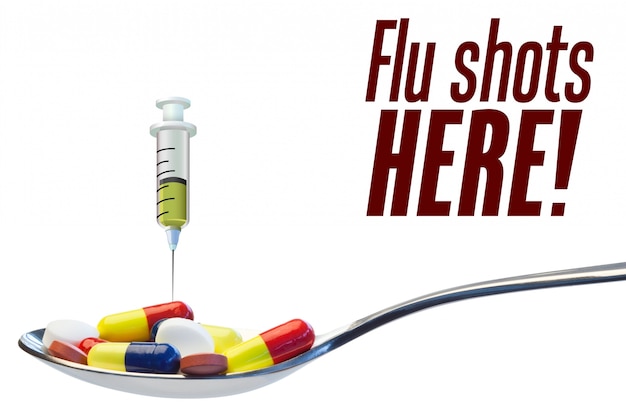It's time for your flu shot this year, and you want to know who should get a flu shot. It's important to avoid the flu and stay healthy.
What are the symptoms of flu? The symptoms of flu are fever and chills, cough, aches, congestion, headache and fatigue. Flu can be debilitating, and often sends victims to the hospital.
Who should get a flu shot? Influenza vaccination, what we call the flu shot, is now routinely recommended for everyone over six months old.
Should you get a flu shot this year if you had a flu shot in previous years? Yes.
Is there is a sufficient supply of the vaccine for everyone? Yes.
How can I prevent the flu? The flu vaccine is the only way to prevent flu.
Can I catch the flu from a flu shot? No, despite the folklore, you can't catch the virus from a flu vaccine. The flu vaccine is a minuscule piece of dead flu virus. It cannot cause infection, because it's not alive.
How does a flu shot work? The flu vaccine tricks your body into manufacturing antibodies that will help it fight the live version of the virus. The flu virus takes several weeks to incubate in your body after you've been exposed, so if you experience flu symptoms a few weeks after your flu shot, they are completely unrelated to your shot.
When should I get a flu shot? It take several weeks for your body to create the antibodies that fight flu, so ideally you should get a flu shot before the start of the flu season and as soon as the vaccine becomes available. In the USA the flu season runs from November through April, with its peak in January.
Do I need to get the flu shot this season if I've had one in past years? The flu virus changes and mutates over time. The flu shot you get this year is an up-to-date vaccine that can fight the latest strains of flu. It is formulated to protect you from the strains of the virus that the Centers for Disease Control, CDC, believe are the biggest threat this year. It is important that your flu shot can protect you from new types of the flu virus.
Does the flu shot always work? No, the flu shot is not effective 100% of the time. But it is reliable and, if you do get the flu, your symptoms will be less severe.
Is the flu shot safe? The flu vaccine is your best defense against the flu. After many years of study and wide use, it has been proven safe and effective.
What are the side effects of a flu shot? Occasionally people notice redness and soreness at the injection site. Other side effects can be fever and muscle aches. Serious allergic reactions are rare but possible. People who are highly allergic to eggs should consult their physician about this.
Will the flu shot prevent a cold? The flu shot will not prevent colds, because colds and flu are different diseases. Influenza is more severe than the common cold and is caused by a different type of virus.
Is flu ever serious? A case of flu, if not treated, can lead to serious complications like bronchitis or pneumonia. These can sometimes cause death. Each year flu sends 200,000 people to the hospital. About 36,000 deaths are caused annually by flu and its complications.
Should I get the flu shot or the nasal mist? Flu vaccines are available in two forms, as an injection and as a nasal spray. The nasal spray influenza vaccine, approved since 2003 and known by the trade name FluMist, contains live, weakened viruses that are no longer capable of causing flu. The nasal spray is not recommended for people over age 50 and children under age 2. Discuss the nasal mist with your doctor if you are healthy and between 5 and 49 years.
Am I in the high-risk group for flu shots? Doctors recommend that people at high-risk for flu and people with impaired immune systems get their annual flu shot. This group includes
What are the symptoms of flu? The symptoms of flu are fever and chills, cough, aches, congestion, headache and fatigue. Flu can be debilitating, and often sends victims to the hospital.
Who should get a flu shot? Influenza vaccination, what we call the flu shot, is now routinely recommended for everyone over six months old.
Should you get a flu shot this year if you had a flu shot in previous years? Yes.
Is there is a sufficient supply of the vaccine for everyone? Yes.
How can I prevent the flu? The flu vaccine is the only way to prevent flu.
Flu Shot Symptoms and who Should Get a Flu Shot
Why should I get a flu shot? Even if you don't get sick very often, a flu shot can prevent missed days at work or school. It will prevent your illness and prevent you spreading the disease to others. The vaccine also prevents deadly epidemics of influenza. The flu vaccine is the only effective way of preventing the flu.Can I catch the flu from a flu shot? No, despite the folklore, you can't catch the virus from a flu vaccine. The flu vaccine is a minuscule piece of dead flu virus. It cannot cause infection, because it's not alive.
How does a flu shot work? The flu vaccine tricks your body into manufacturing antibodies that will help it fight the live version of the virus. The flu virus takes several weeks to incubate in your body after you've been exposed, so if you experience flu symptoms a few weeks after your flu shot, they are completely unrelated to your shot.
Do I need to get the flu shot this season if I've had one in past years? The flu virus changes and mutates over time. The flu shot you get this year is an up-to-date vaccine that can fight the latest strains of flu. It is formulated to protect you from the strains of the virus that the Centers for Disease Control, CDC, believe are the biggest threat this year. It is important that your flu shot can protect you from new types of the flu virus.
Does the flu shot always work? No, the flu shot is not effective 100% of the time. But it is reliable and, if you do get the flu, your symptoms will be less severe.
Is the flu shot safe? The flu vaccine is your best defense against the flu. After many years of study and wide use, it has been proven safe and effective.
What are the side effects of a flu shot? Occasionally people notice redness and soreness at the injection site. Other side effects can be fever and muscle aches. Serious allergic reactions are rare but possible. People who are highly allergic to eggs should consult their physician about this.
Will the flu shot prevent a cold? The flu shot will not prevent colds, because colds and flu are different diseases. Influenza is more severe than the common cold and is caused by a different type of virus.
Is flu ever serious? A case of flu, if not treated, can lead to serious complications like bronchitis or pneumonia. These can sometimes cause death. Each year flu sends 200,000 people to the hospital. About 36,000 deaths are caused annually by flu and its complications.
Should I get the flu shot or the nasal mist? Flu vaccines are available in two forms, as an injection and as a nasal spray. The nasal spray influenza vaccine, approved since 2003 and known by the trade name FluMist, contains live, weakened viruses that are no longer capable of causing flu. The nasal spray is not recommended for people over age 50 and children under age 2. Discuss the nasal mist with your doctor if you are healthy and between 5 and 49 years.
- School-aged children
- Adults over the age of 50
- People living in long-term care facilities, dormitories and group homes where infectious disease can spread rapidly
- Anyone with chronic illness such as diabetes, asthma, emphysema and kidney disease
- Pregnant women after the first trimester
- People with weakened immune systems, HIV-positive or undergoing cancer treatment.
- Health care workers
- Caregivers of infants under 6 months old




No comments:
Post a Comment